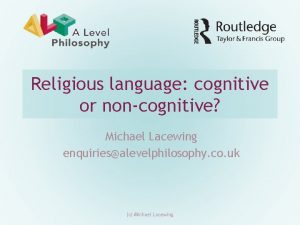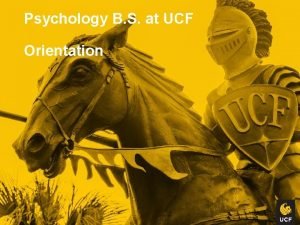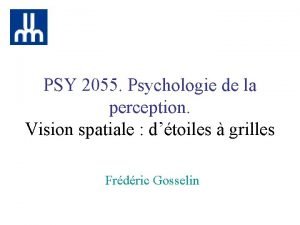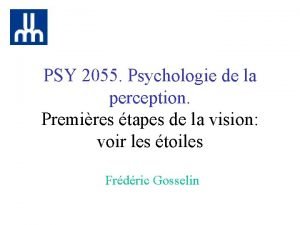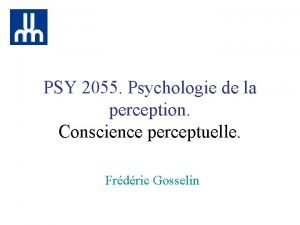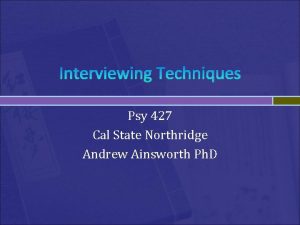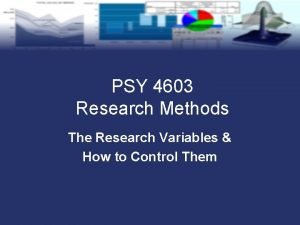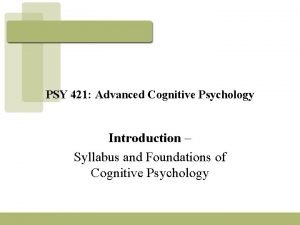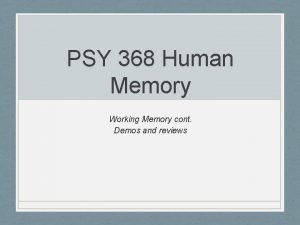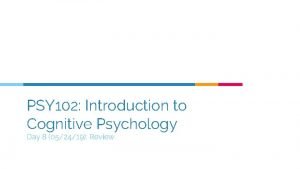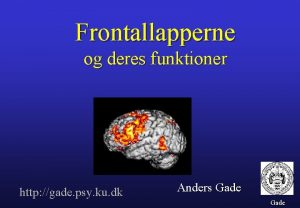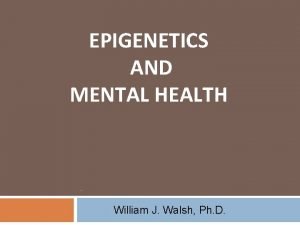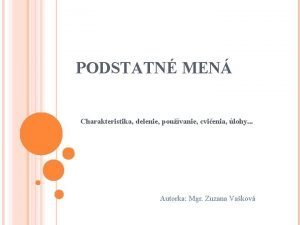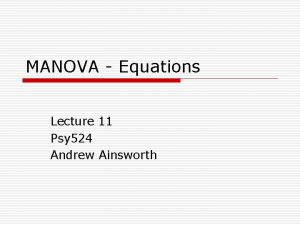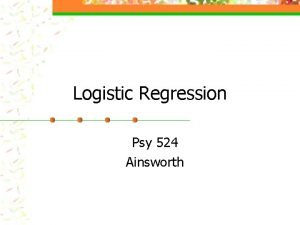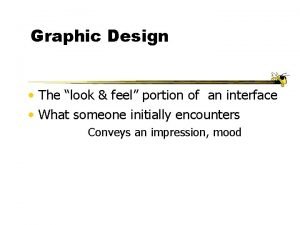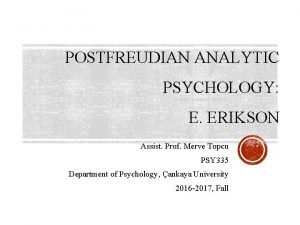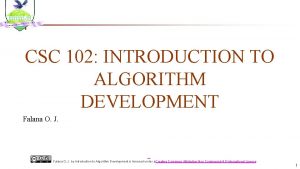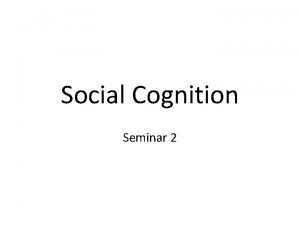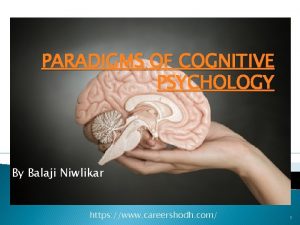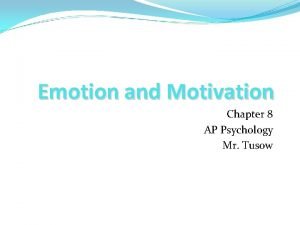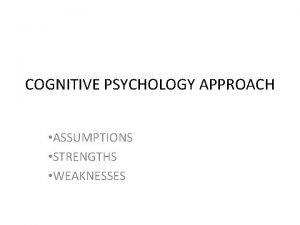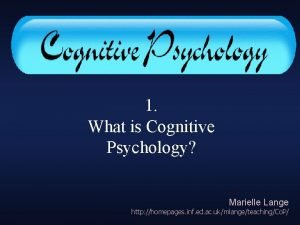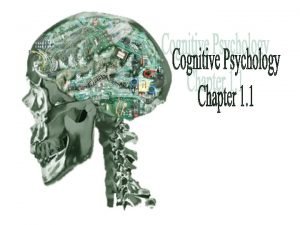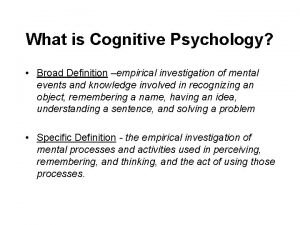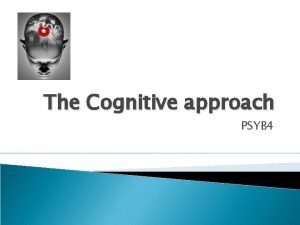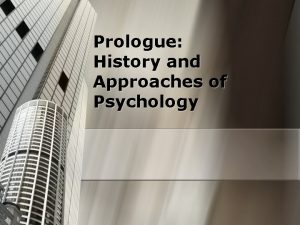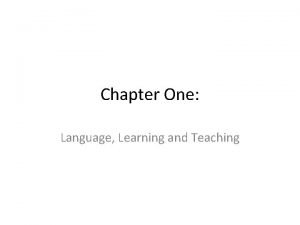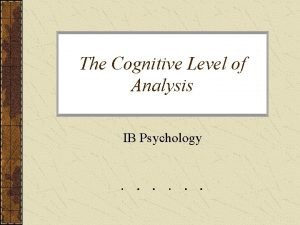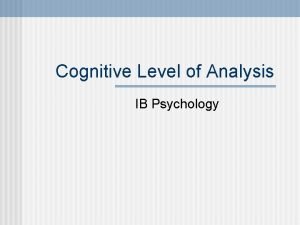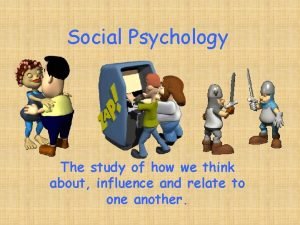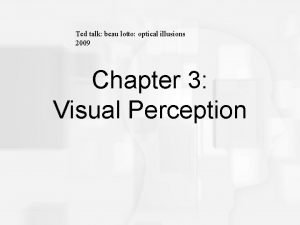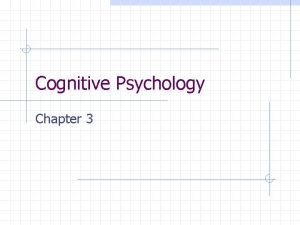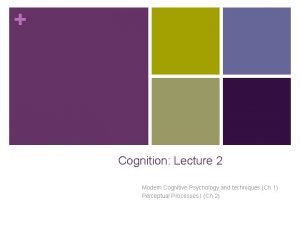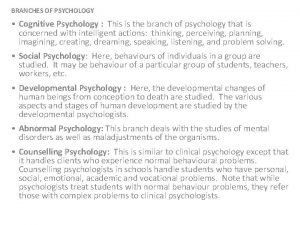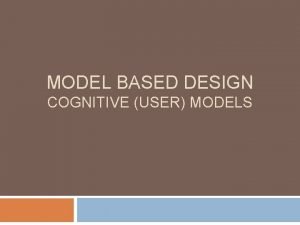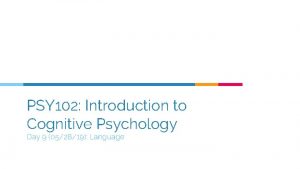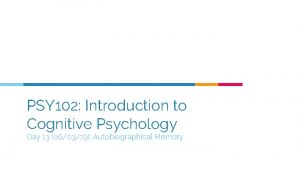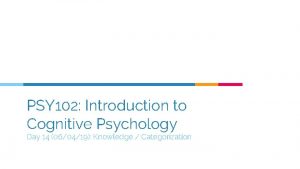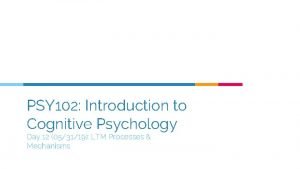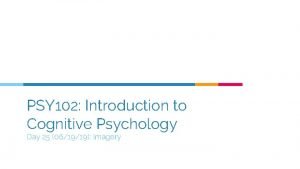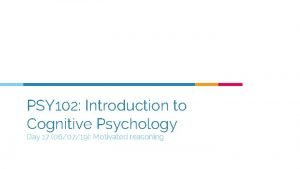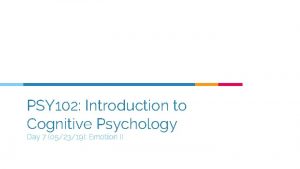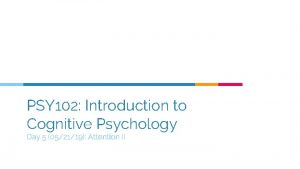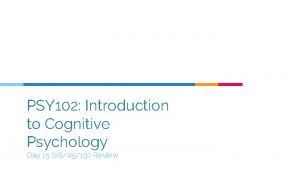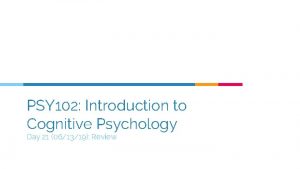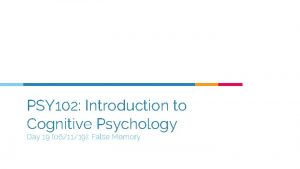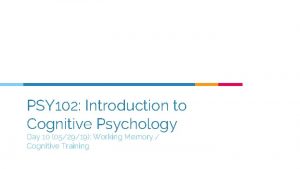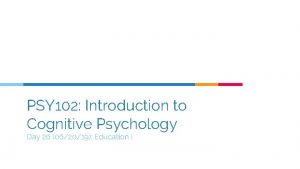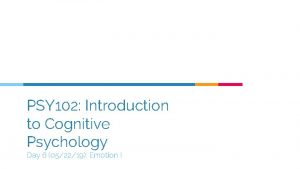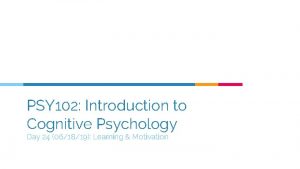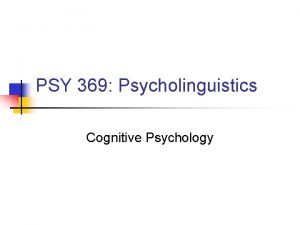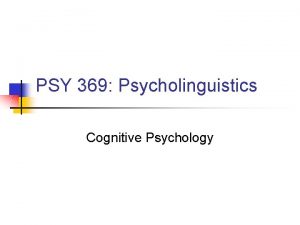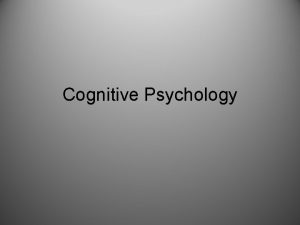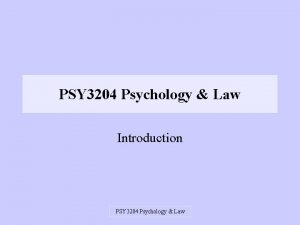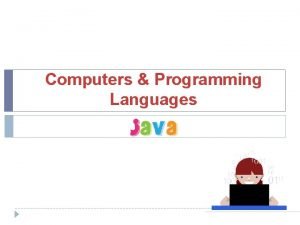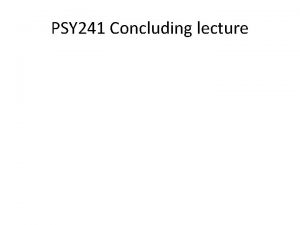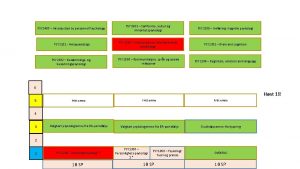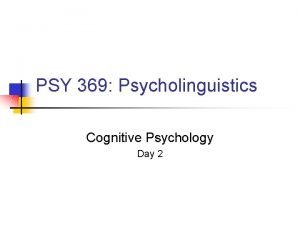PSY 102 Introduction to Cognitive Psychology Day 16





































![Pryor et al. (2019) “In the previous study, approximately 25% of [gender] participants aged Pryor et al. (2019) “In the previous study, approximately 25% of [gender] participants aged](https://slidetodoc.com/presentation_image_h2/a7645e7355353978ad53bebacf019f6a/image-38.jpg)













- Slides: 51

PSY 102: Introduction to Cognitive Psychology Day 16 (06/06/19): Decision-making

Today’s Goals + Agenda 1. LO 1: Continue to build a supportive classroom culture & discuss science communication ○ Mention selecting Duke Research Blog articles ○ Apply Lombrozo (2014) piece to our academic journal article readings: mainly, how does a neuroscientific perspective impact decision-making? 2. LO 2: Describe the basic fundamental principles of decision-making research ○ Describe classic theory of decision-making (expected utility) as it applies to everyday scenarios ○ Describe endowment effect, how emotions impact decision-making, delaydiscounting, loss aversion, risk behaviors, the framing effect, dual systems theory, neuroeconomics, & the trolley problem. 3. LO 3: Summarize and critically analyze academic journal articles ○ How do these papers inform our understanding of how people make decisions? ○ How can we apply these findings to everyday life? How does our discussion on sampling factor here? What else would you want to do to build off these studies?

Tomorrow’s Work Readings: ▷ ▷ Stanley et al. (2019) (motivated reasoning in political behavior) Pennycook & Rand (2018) (it’s critical thinking, not motivated reasoning!) Podcast: ▷ NPR Hidden Brain: “I’m Right, You’re Wrong” Quiz (AM, categorization, today’s topics) Theme: Can we change people’s minds?

Judgment & Decision-Making ▷ ▷ ▷ Judgment: holding a conclusion about something Decisions : the process of making choices between alternatives Reasoning: the process of drawing conclusions ○ Very related processes

Splitting Decision-making & Reasoning ▷ Making Judgements (Friday) ▷ Decision-making: Choosing Among Alternatives (Today) ▷ Deductive Reasoning: Syllogisms & Logic (Monday)

Endowment Effect ▷ Retain the object you own than acquire the same object when you don’t own it “What belongs to us, and what we give away, always seems very precious to us. ” -Aristotle

Today’s thesis statement: Even if we think we are, on balance, rational people, a lot of things other than rationality affect our decisions!

How our decision-making isn’t entirely rational ▷ ▷ Expected utility theory ○ …and how we don’t actually behave in accordance with it Dual-systems theory

Expected Utility ▷ ▷ People are rational If they have all the relevant information, they will behave in the optimal way for their own benefit ▷ “Maximize expected utility” ○ On this theory, utility = $$ ○ Maximize money ■ Good: specific procedures to determine “best choice” ■ BUT….

But we tend NOT to maximize our expected utility

But we tend NOT to maximize our expected utility

But we tend NOT to maximize our expected utility

But we tend NOT to maximize our expected utility ▷ You can either have… ○ $10 today ○ $15 next week

But we tend NOT to maximize our expected utility ▷ You can either have… ○ $10 today ○ $100 next year

But we tend NOT to maximize our expected utility ▷ You can either have… ○ $10 today ○ $100 next year ▷ Delay discounting = discounting (devaluing) rewards as the rewards become farther away in time

Emotions Affect Decisions, Too ▷ Expected emotions ○ Emotions that people predict that they will feel concerning an outcome ■ Imagining vs. imagined event (Stanley et al. , AM counterfactual simulation) ▷ People inaccurately predict their emotions ○ Predictor of risk aversion

Emotions Affect Decisions, Too ▷ Incidental emotions: Emotions that are not specifically related to decision-making ○ May be related to one’s general disposition or personality, some recent experience, or one’s general environment or surroundings ○ Can affect one’s overall decision making processes ○ E. g. , Hanger study / Lindquist!

Our judgments about risk are also weird Imagine that the United States is preparing for the outbreak of an unusual disease that is expected to kill 600 people. Two alternative programs to combat the disease have been proposed. ▷ ▷ If Program A is adopted, 200 people will be saved. If Program B is adopted, there is a 1/3 probability that 600 people will be saved, and a 2/3 probability that no one will be saved.

Our judgments about risk are also weird Imagine that the United States is preparing for the outbreak of an unusual disease that is expected to kill 600 people. Two alternative programs to combat the disease have been proposed. ▷ ▷ If Program C is adopted, 400 people will die. If Program D is adopted, there is a 1/3 probability that nobody will die, and a 2/3 probability that 600 people will die.

Our judgments about risk are also weird If Program A is adopted, 200 people will be saved. If Program B is adopted, there is a 1/3 probability that 600 people will be saved, and a 2/3 probability that no one will be saved. ▷ ▷ 72% wanted to go with Program A (definite strategy (risk aversion)). ● ▷ ▷ If Program C is adopted, 400 people will die. If Program D is adopted, there is a 1/3 probability that nobody will die, and a 2/3 probability that 600 people will die. 78% wanted to go with Program D (risky strategy (risk-taking)). Framing effect : decisions are influenced by how the choices are framed ○ When choices are framed in terms of gains, people tend to be risk-averse ○ When choices are framed in terms of losses, people tend to be risk-taking

More Framing Effect ▷ ▷ Decisions depend on how choices are presented ○ Opt-in procedure ■ Active step to be organ donor ■ 85% Americans approve, only 28% granted ○ Opt-out procedure ■ Organ donor unless request not to be ■ France/Belgium at >99% consent Status quo bias ○ The tendency to do nothing when faced with making a decision

Neuroeconomics ▷ Sanfey and coworkers (2003) ○ Ultimatum game ○ Often rejected low offers because they became angry that offers were unfair ○ Less angry with an “unfair” computer

Dual Systems Theory System 1 System 2 ▷ ▷ Intuitive Fast Nonconscious Automatic ▷ ▷ Reflective Slow Conscious Controlled ▷ Heuristic-based (for better or worse) ▷ Can overrule heuristics with deliberate thinking (for better or worse)

How do these theories play out in real-world contexts? Trolley Problemhttps: //www. wnycstudios. org/story/ driverless-dilemma 4: 30 -6: 20



Trolley Problem ▷ Which dilemma would you rather face? ▷ In the lever version, what do you think people are likely to say? ▷ The footbridge version? ▷ What’s the difference between them, subjectively? ▷ What will happen when we have driverless cars?

Pearson et al. (2018) Judgements about crimes ▷ What was the question addressed here? ▷ How did they address the question? ▷ What did they find? Think about each figure & summarize overall result & each figure in 1 sentence. ▷ Did they identify any limitations? Do you think they handled these limitations appropriately? ▷ What do you want to know more about, after reading this study?

Pearson et al. (2018)

Pearson et al. (2018)

Pearson et al. (2018)

Pearson et al. (2018)

Can we bias people to view evidence differently? How neuroscience shapes punishment (Lombrozo, 2014)

Pryor et al. (2019) Arbitrary Social Norms ▷ What was the question addressed here? ▷ How did they address the question? ▷ What did they find? Think about each figure & summarize overall result & each figure in 1 sentence. ▷ Did they identify any limitations? Do you think they handled these limitations appropriately? ▷ What do you want to know more about, after reading this study?

Pryor et al. (2019) “Imagine you have witnessed a man rob a bank. However, you then saw him do something unexpected with the money. He donated it all to a run-down orphanage that would benefit greatly from the money. You must decide whether to call the police and report the robber or do nothing and leave the robber alone. ”

Pryor et al. (2019) “Imagine you are hiring someone for a job at your firm. Your friend has applied for the position and is qualified. However, another applicant seems to be even more qualified. ”

Anchoring Heuristic ▷ When faced with an estimation task… ○ Use prior knowledge as an anchor (even if you just got it) - i. e. , a reference point ○ Adjust away ○ (It’s usually an insufficient adjustment, so initial anchor makes a BIG difference)
![Pryor et al 2019 In the previous study approximately 25 of gender participants aged Pryor et al. (2019) “In the previous study, approximately 25% of [gender] participants aged](https://slidetodoc.com/presentation_image_h2/a7645e7355353978ad53bebacf019f6a/image-38.jpg)
Pryor et al. (2019) “In the previous study, approximately 25% of [gender] participants aged [age range] that rated high in [personality description] were allocated to [randomly popular action] and then rate how they would feel, due to an error in their random allocation. ”

Pryor et al. (2019) “The previous study used a completely different moral dilemma that happened to also involve a robber. In the previous study, approximately 75% of [gender] participants aged [age range] that rated high in [personality description] were allocated to randomly popular action] and then rate how they would feel, due to an error in their random allocation. ”

Pryor et al. (2019) approximately 75% of female participants that rated high in extraversion and agreeableness were allocated to imagine calling the police and reporting the robber and then rate how they would feel, due to an error in their random allocation. approximately 75% of male participants that rated low in extraversion and agreeableness were allocated to imagine doing nothing and leaving the robber alone and then rate how they would feel, due to an error in their random allocation. ”

Today’s Goals + Agenda 1. LO 1: Continue to build a supportive classroom culture & discuss science communication ○ Mention selecting Duke Research Blog articles ○ Apply Lombrozo (2014) piece to our academic journal article readings: mainly, how does a neuroscientific perspective impact decision-making? 2. LO 2: Describe the basic fundamental principles of decision-making research ○ Describe classic theory of decision-making (expected utility) as it applies to everyday scenarios ○ Describe endowment effect, how emotions impact decision-making, delaydiscounting, loss aversion, risk behaviors, the framing effect, dual systems theory, neuroeconomics, & the trolley problem. 3. LO 3: Summarize and critically analyze academic journal articles ○ How do these papers inform our understanding of how people make decisions? ○ How can we apply these findings to everyday life? How does our discussion on sampling factor here? What else would you want to do to build off these studies?

Participation + Minute Paper https: //tinyurl. com/PSY 102 Participation https: //tinyurl. com/PSY 102 Minute. Paper. June 6

Additional Practice Optional: Test Yourself

General Question Our thesis statement today was about people not always making rational decisions. Do people act in line with the expected utility theory? How would you explain evidence for our thesis to someone else?

Expected utility theory is most applicable to deciding whether to: A. Break up or stay involved with a current partner. B. Go out for junior varsity hockey or junior varsity basketball C. Buy first class or coach tickets for a spring break trip D. Take astronomy or geology as a physical science elective course.

Josiah is trying to decide whether or not to take a new job in a new city. He is worried that if he takes the job and fails, he will suffer from intense anxiety and depression. This is an example of: A. Expected emotion B. Immediate emotion C. Integral immediate emotion D. Incidental immediate emotion

People tend to overestimate A. What negative feelings will occur following a decision more so than positive feelings B. What positive feelings will occur following a decision more so than negative feelings C. What positive and negative feelings will occur following a decision to the same degree D. Subjective utility values following a decision

Juanita is in a convenience store considering which soda to buy. She recalls a commercial for Big. Fizz she saw on TV last night. Big. Fizz is running a promotion where you look under the bottle cap, and one in five bottles has a voucher for a free soda. If Juanita decides to purchase a Big. Fizz based on this promotion, which is framed in terms of _____, she will use a _____ strategy A. Losses; risk-taking B. Gains; risk-taking C. Losses; risk-aversion D. Gains; risk-aversion

Many people receive unsolicited calls from telemarketers or unwanted “junk” mailers advertising offers for products such as cable or internet services or cellular phone companies. Most people do not consider these offers and do not make a change to the plans or services that they receive because they do not want to make a decision that requires serious consideration or thought. This is an example of the ____ bias A. Actor-observer B. Dual systems C. Self-serving D. Status quo

Cecile has dreamed of owning her own home for years, and she can finally afford a small cottage in an older neighborhood. She notices that she feels more positive about her home when she drives home by the abandoned shacks, but she hates her home when driving past the fancy mansions with their large lawns. Cecile's emotions are influenced by A. The principle of diversity B. Confirmation bias C. The framing effect D. The law of large numbers

MC Answer Key Slide 44: C Slide 45: A Slide 46: A Slide 47: D Slide 48: D Slide 49: D Slide 50: C
 Day 1 day 2 day 3 day 4
Day 1 day 2 day 3 day 4 Day 1 day 2 day 817
Day 1 day 2 day 817 Cognitive and non cognitive religious language
Cognitive and non cognitive religious language Psychology 102 practice test
Psychology 102 practice test Euro psy
Euro psy Clep ucf
Clep ucf Psy 2055
Psy 2055 Psy 2055
Psy 2055 Psy 2055
Psy 2055 Psy
Psy Daniel sanin
Daniel sanin Psy
Psy Psy 421
Psy 421 Phonological loop
Phonological loop Psy
Psy Psy 226
Psy 226 Suppose twin teenagers are vying
Suppose twin teenagers are vying Psy academy
Psy academy Nukleus caudatus
Nukleus caudatus Psy walsh
Psy walsh Pes charakteristika
Pes charakteristika Padove pripony
Padove pripony 11 psy
11 psy Regression psy
Regression psy Psy
Psy What is adoloscence
What is adoloscence Csc 102 introduction to problem solving
Csc 102 introduction to problem solving Cognitive psychology concepts
Cognitive psychology concepts Careershodh
Careershodh Emphasis
Emphasis Cognitive appraisal psychology definition
Cognitive appraisal psychology definition Explain one assumption of the cognitive approach
Explain one assumption of the cognitive approach 5 major domains of psychology
5 major domains of psychology Cognitive economy psychology definition
Cognitive economy psychology definition Computer metaphor psychology
Computer metaphor psychology History of cognitive psychology
History of cognitive psychology History of cognitive psychology
History of cognitive psychology Cognitive meaning in psychology
Cognitive meaning in psychology Cognitive model psychology
Cognitive model psychology Cognitive psychology crash course
Cognitive psychology crash course Cognitive model psychology
Cognitive model psychology Structural linguistics and behavioral psychology
Structural linguistics and behavioral psychology Hamid zolfaghari
Hamid zolfaghari Ib psychology cognitive level of analysis
Ib psychology cognitive level of analysis Ib psychology cognitive level of analysis
Ib psychology cognitive level of analysis Cognitive dissonance ap psychology
Cognitive dissonance ap psychology Cognitive therapy ap psychology
Cognitive therapy ap psychology Cognitive psychology
Cognitive psychology Transduction cognitive psychology
Transduction cognitive psychology Cognitive psychology
Cognitive psychology Branches of psychology
Branches of psychology Cognitive modelling
Cognitive modelling


